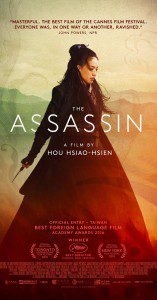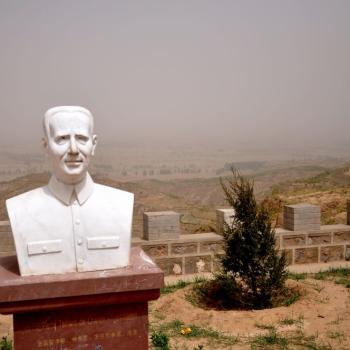“Wuxia” is the name of the Chinese dramatic martial arts genre and Taiwan’s legendary filmmaker Hou Hsiao-hsien’s latest film “The Assassin” is a stunningly beautiful example of the art form. The film won “Best Director” for Hou Hsiao-hsien at Cannes earlier this year and musician/composer Giong Lim’s soundtrack was also awarded at Cannes. “The Assassin” is Taiwan’s official entry for the 2016 Academy Awards.
The film opens in ninth century China where treachery and corruption are rife. Nie Yinniang (Shu Qi) is a young woman who was kidnapped as a child. A Buddhist nun has raised her in exile and trained her to become as assassin to kill corrupt officials. Now, thirteen years later, she is ordered to return to her home province of Weibo with orders to kill Tian Ji’an (Chang Cheen). He is now Weibo’s governor, a man to whom she was betrothed while still a child.
The plot of “The Assassin” takes some time to emerge but we get a first major hint of where things are going when Nie Yinniang, in confronting her parents, memories and long-repressed feelings, chooses mercy over political murder. She is a trained stealth assassin, but is this who is she really? The psychological plotline adds moral depth to Nie Yinniang’s character and gives the film meaning beyond the admirable choreograph of martial arts and the film’s exquisite cinematography.
“The Assassin” reminded me of other wuxia films such as Zhang Yimou’s 2003 “Hero” that without saying much communicated to audiences that the pen is indeed mightier than the sword. Ang Lee’s 2000 “Crouching Tiger, Hidden Dragon” is, perhaps, the best known of wuxia films.
The themes of non-violence vs. violence, the self-sacrifice of the hero for the good of others, are evident in wuxia films but this one, with a woman as the hero, reverses the traditional masculine and feminine roles and invites us to sit back and contemplate the heroine’s dilemma and her choices. I think “The Assassin” is a film with feminist sensibilities but it will take a female director and her team to perhaps make the ultimate wuxia film with a female lead.
A final question: are martial arts forms of violence or an art form? “The Assassin” certainly makes this a tough question to answer.
In Mandarin with English subtitles
P.S. And if you think this story is even close to Tarantino’s “Kill Bill” pair of martial arts films, know this is a very different story and film.













